A simple recipe for mapo tofu that captures the true flavor of China uses soft tofu cooked in a flavorful sauce that is rich, spicy, and delicious. For an effortless, delicious, and healthful weeknight dinner, serve it over steaming rice.
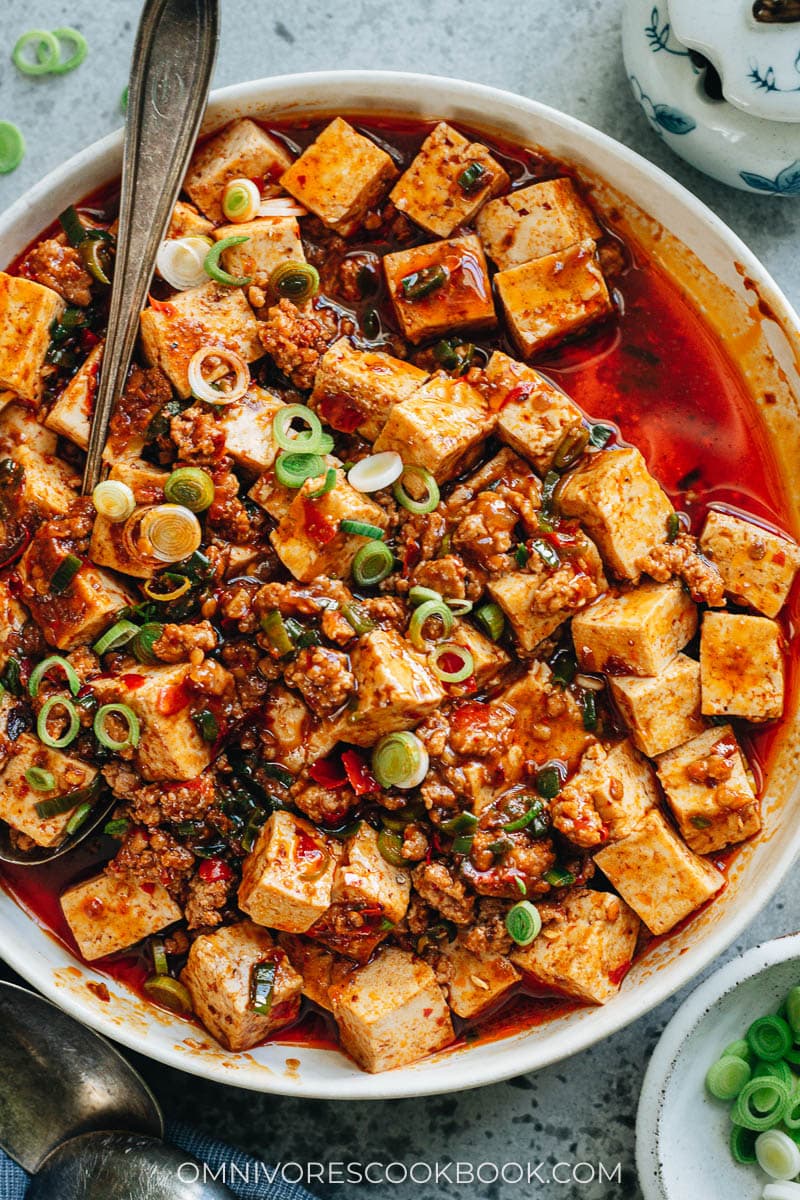
Mapo tofu (麻婆豆腐, ma po dou fu) is one of the most popular dishes from Sichuan cuisine. The tofu pieces are braised in a rich spicy, and savory sauce along with fresh garlic and scallions, with a small amount of ground pork to enhance the flavor. The dish is so appetizing and it goes perfectly with steamed rice.
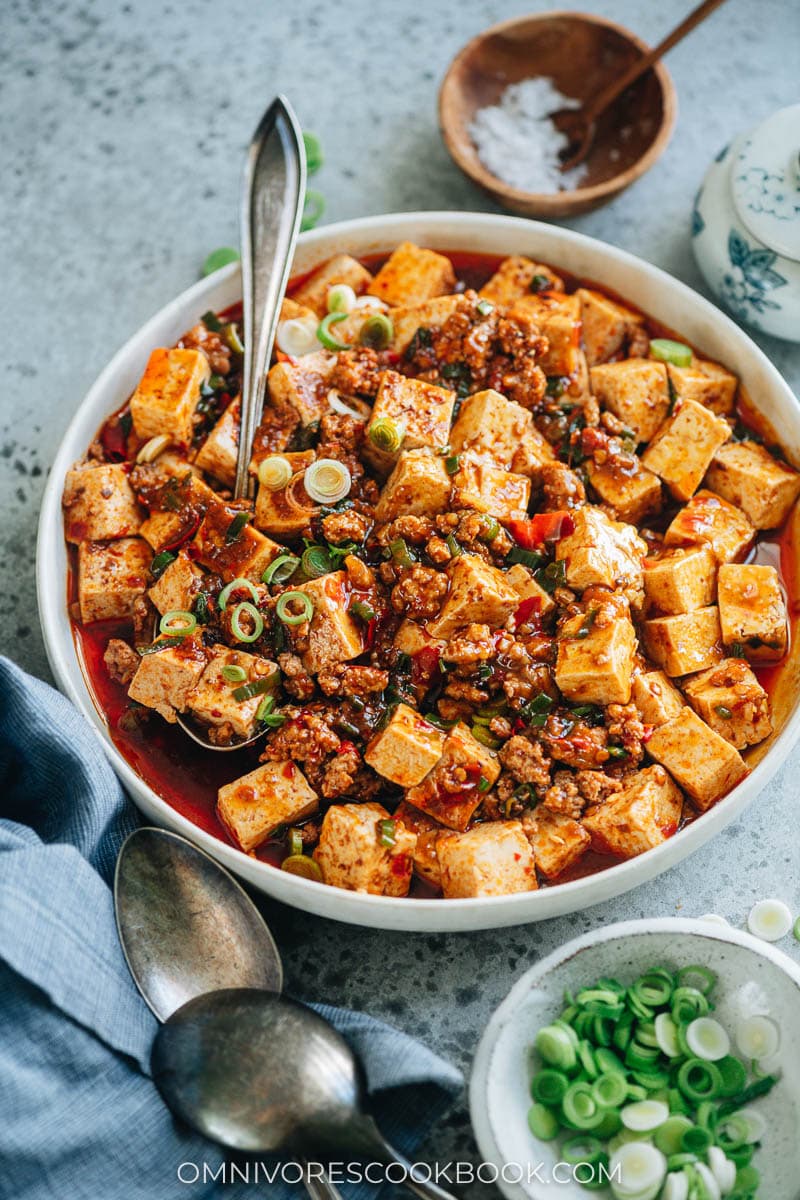
Key ingredients for Mapo Tofu
Doubanjiang
Doubanjiang (豆瓣酱), also known as spicy fermented bean paste or broad bean sauce, is the most important ingredient in mapo tofu. And it has a strong fermented savory, salty and spicy taste. Try to find “Pixian Broad Bean Paste” at your Asian market. Pixian is a small county in Sichuan province that produces the best broad bean paste. If you’re using this brand, you’re already halfway there. You can also purchase this brand on Amazon here.
NOTE: Depending on the brand of Doubanjiang you use, the salt and spiciness level can vary a lot. This dish is designed to be served with rice, so it’s on the salty side. If you want to make your dish less salty and spicy, reduce the amount of Doubanjiang (to 2 tablespoons).
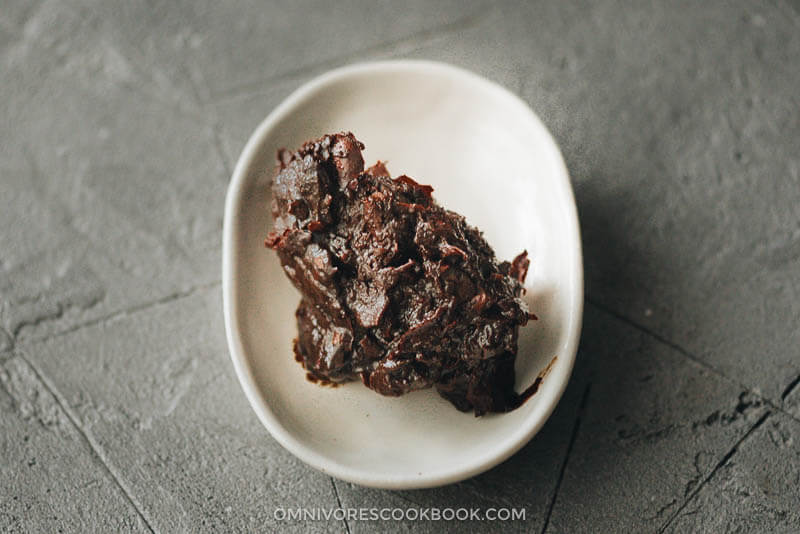
Sichuan peppercorns
Sichuan peppercorn (花椒, hua jiao) is another main ingredient in any Sichuan dishes. It has a citrusy taste with a numbing tingling sensation when you chew on it. It’s a secret to add aroma to your dish that no other ingredient can replace. You can purchase Sichuan peppercorns at Asian grocery stores, but I highly recommend these premium fresh ones from The Mala Market.
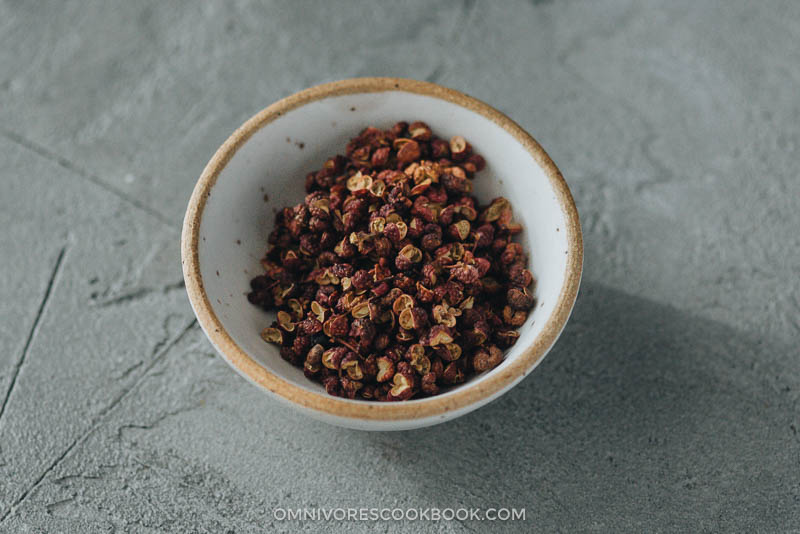
Homemade chili oil
The other important ingredient is chili oil (辣椒油). Although you can purchase bottled chili oil at the grocery store, I highly recommend you make it at home. Freshly cooked chili oil tastes much better than store-bought and is free of additives. You only need a few minutes to cook it and it is really easy. You can find an easy chili oil recipe here. And if you prefer to purchase it instead of making your own, you can also find it on Amazon.
PS. You will usually cook more chili oil than you’re able to use in one meal. You can store the extra oil in an airtight container in the fridge for 6 months up to a year. You can use the chili oil in various dishes, including bang bang chicken, dan dan noodles, Sichuan spicy wonton in red oil, and Fu Qi Fei Pian (Sliced beef in hot sauce). You can also add it into a dipping sauce for potstickers, or add it to wonton soup to enhance the flavor, or even put it on oatmeal!
It might look like you need so many specialty ingredients for this one dish. But trust me, if you love Sichuan food, you’ll be using them again and again.
How to cook mapo tofu
Once you gather the ingredients, making mapo tofu is a super easy process.
- Fry the Sichuan peppercorns in the oil to infuse the aroma
- Cook the ground pork with doubanjiang
- Once the pork is cooked, add the green onions and stir a few times
- Add the broth and braise with the cover on
- Drizzle in the cornstarch slurry to thicken the sauce
That’s it! I think this is one of the easiest Sichuan recipes and the result is super rewarding 🙂
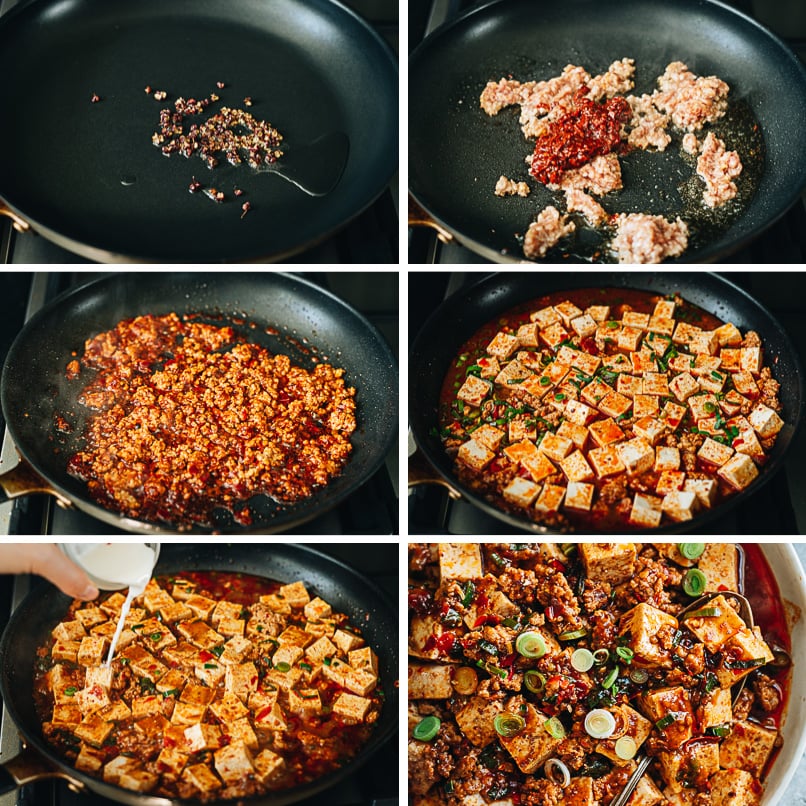
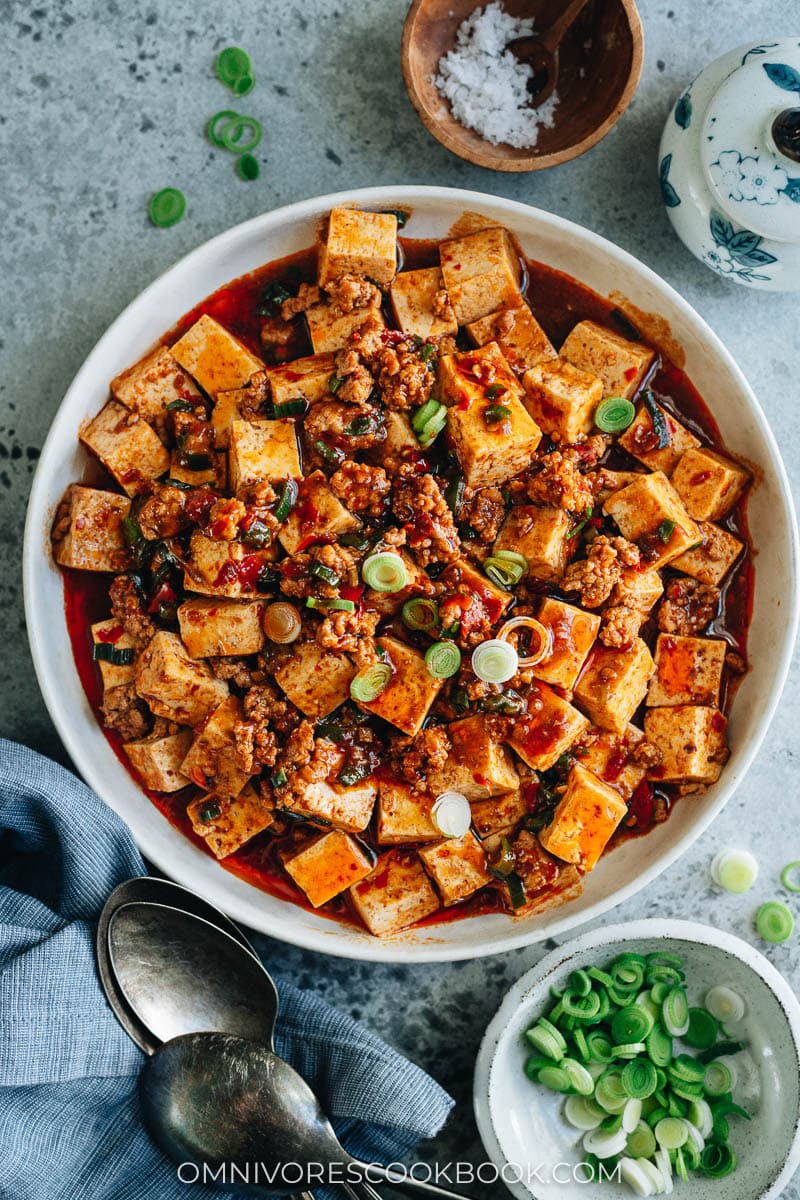
Frequently asked questions
What type of tofu to use for mapo tofu
There is no correct answer to this, and you should choose what works best for you.
Some Chinese restaurants, including many in China, prefer to use soft or silken tofu to make this dish. It creates a very silky tofu texture that melts in your mouth. This method does require some experience in handling tofu, so you won’t break apart the very delicate silken tofu while cutting and cooking.
On the other hand, you can also use extra firm, firm or medium tofu for this dish. These types of tofu are much easier to handle. Plus, once you braise it in the rich spicy sauce, it absorbs a lot of flavor and tastes great.
Do I need a wok to cook mapo tofu?
Not at all! I found it’s easiest to cook mapo tofu in a nonstick pan. The tofu will sit flat in the broth and absorb all the flavor. Not to mention it won’t stick to the pan easily or fall apart when you stir it.
Can you recommend a gluten-free doubanjiang?
Doubanjiang usually contains fermented wheat, which is not gluten-free. Unfortunately I hadn’t found a great tasting gluten-free doubanjiang at the time of writing this post.
There is a Japanese brand doubanjiang that’s gluten-free and I see it quite often at Asian markets and on Amazon. Compared to the Chinese brand, this one is quite salty and has less fermented taste. If you decide to use this one for your mapo tofu, you should reduce the amount (to 2 tablespoons) so your dish won’t end up too spicy and salty.
How to make mapo tofu vegetarian or vegan?
I have a vegan mapo tofu here that tastes super flavorful and great!
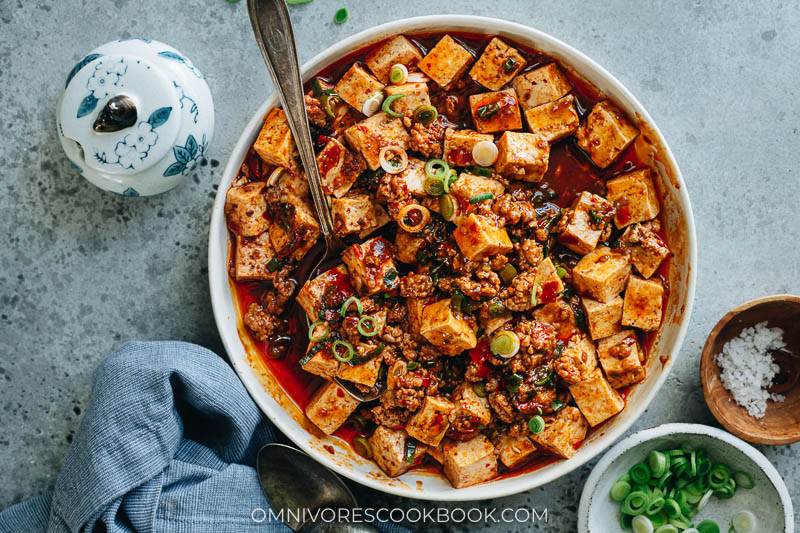
How to serve mapo tofu
I love cooking mapo tofu for a quick lunch or dinner and serving it over steamed rice. Sometimes I double the meat and sauce, so it will be enough to serve two people as a one-dish meal. I also like to add a handful of greens (spinach, garlic chives, or other tender greens such as chopped up baby bok choy) at the end of braising before adding the cornstarch, to create a more nutritious and balanced meal. Sometimes I also replace the ground pork (used in the authentic version) with ground turkey to cut calories.
For special diets, you can make it less spicy and skip the rice so it will be paleo-friendly. You can also make it into a vegan dish by replacing the meat with mushrooms.
Yes, mapo tofu is such a versatile dish!
Source: https://omnivorescookbook.com








